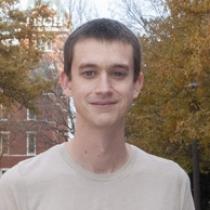
Terry Stevenson
What is your next adventure?
I have accepted a job at NASA Ames as a research engineer in their small sats group. One of the projects I'll probably see is the Biosentinel cubesat. It's a six-unit small sat. We'll probably be working on the propulsion system.
What about your next adventure are you most looking forward to?
Working at Ames will be cool. I've enjoyed working with NASA while I've been here as a student researcher, but I'm sure we'll have greater resources at the Center.
Did you have any previous co-op, internship, or research experience in this area?
My research at Tech focused on multi-functional structures like small sats, where we were providing not just the physical support for the components, but also a propulsion system. We designed in CAD and 3D printed the entire system, so I got to work on all of the pieces for the lifecyle of this system - from concept, to 3D design, to assembling, to testing, and finally, to delivering it this past summer to Ames. The second part of our work was hollowing out the structure, with the goal of having it be very compact. So the propulsion system was inside the structure.
I have interned at Ames and worked with them remotely, at Tech. The summer of 2018, I worked at JPL, where we did the entire concept design for a multi-function structure for a planetary probe.
How did your educational experience at Georgia Tech help you to achieve your goals?
Dr. Lightsey, my advisor, deserves a lot of credit. He's good at keeping people on track - his lab is well-run - he's always willing to help out, but he is also willing to step back and let you pursue your own questions. He made the whole process of grad school a lot easier. His critques were thoughtful and fair.
Georgia Tech has a lot of opportunities to work on different projects that are space-related - Prox 1, RANGE, TARGIT - and that makes it very exciting to pursue a degree here. And you always know that there are opportunities to collaborate with people outside your project.That's given me a lot of breadth in my experience here.
What advice would you give to an underclassman who would like to follow the same path?
Classes are important, but they are not enough. There are opportunities to work on a lot of things outside of class, and you should take them. Grad school is the chance to gain that breadth of knowledge, to try different things. When you go to work for a company, you will be paid to do just one thing.
There's an opportunity to pick up random skills that may not be related to your research. I working on multi-functional structures which inovlves a lot of mechanical design, but I've also ended up working on electronics, circuit boards, because it was a need we had at the tiem - to design custom circuit boards. I think Ames hired me because I was willing to understand how different parts of a system work together. That learning was valuable.
A Ph.D. is about becoming a specialist, so you really go deep. But it's also a chance to branch out over time. My advice would be to pick up large assortment of skills along the way. It will help you in ways you can't imagine.